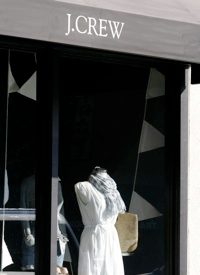
A controversial website advertisement for the preppy clothing store J. Crew features a mother painting her son’s toenails a shade of neon pink. The woman in the advertisement is in fact the creative director of J.Crew, Jenna Lyons.
The Blaze explains: "In a feature on the website called 'Saturday with Jenna,' Lyons is pictured with her young son Beckett — and his toes are painted neon pink. In a caption nearby, Lyons declares, 'Lucky for me I ended up with a boy whose favorite color is pink. Toenail painting is way more fun in neon.'"
Responding to the advertisement, child expert Dr. Keith Ablow remarks, “This is a dramatic example of the way that our culture is being encouraged to abandon all trappings of gender identity.”
Ablow continues:
If you have no problem with the J. Crew ad, how about one in which a little boy models a sundress? What could possibly be the problem with that?
Well, how about the fact that encouraging the choosing of gender identity, rather than suggesting our children become comfortable with the ones that they got at birth, can throw our species into real psychological turmoil — not to mention crowding operating rooms with procedures to grotesquely amputate body parts? Why not make race the next frontier? What would be so wrong with people deciding to tattoo themselves dark brown and claim African-American heritage? Why not bleach the skin of others so they can playact as Caucasians?
Eric Brown of the Media Research Center notes, “Not only is Beckett likely to change his favorite color as early as tomorrow, Jenna’s indulgence (or encouragement) could make life hard for the boy in the future.”
One parent pondered online, “Why would I want my son to paint his toenails pink? Why would I want my son to paint his toenails at all?”
Brown also asserts that the advertisement is “blatant propaganda celebrating transgendered children.”
The fashion world has not limited its focus to children, however. It has long celebrated androgyny as an opportunity to “equalize the sexes.”
FashionTheory.org writes:
Gender, to me, is a system of categorization that marks human bodies. Androgyny appears to fluctuate between an ideal and a source of fear for humans. The androgynous figure challenges gender boundaries by presenting a body immune from classification according to our current system…. It has the potential to equalize the sexes. Also, androgyny as a source of fear suggests human discomfort with the unknown and the inherent comfort of boundaries — with strict and specific distinctions and regulations things are easier, although not necessarily better.
Unfortunately, such propaganda has not been limited to the world of fashion. In 2009, the United Nations published a report promoting a new human right to explicit sexual education for young children. According to the report, global sexual education for children should adhere to the controversial UNESCO guidelines and the Yogyakarta Principles. Victor Munoz, the author of the report, contended that sexual education should include “sexual diversity,” and asserted that denying the existence of the lesbian, gay, transsexual, transgender, and bisexual population can lead to greater discrimination.
Still, some believe reactions to the J. Crew ad are a bit over the top. Jo B. Paoletti, author of Pink and Blue: Telling the Girls from the Boys in America, responds, “Lots of kids, say seven and under, might ask their parents for something that would seem to be cross gender, and I think most parents, especially in the privacy of their own home, might think, what’s the big deal?”
Likewise, Mara Keisling, executive director of National Center for Transgender Equality, remarks, “This is not how the world works and now how children work, and not even how trans advocacy works. Complaints about the ad are totally blown out of proportion.” She adds, “It’s just a cute ad with a cute mom-and-son scene and the kid wants to wear pink nail polish. It could be the kid just wants to spend time with his mom.”
Despite efforts to normalize transgendered lifestyles, however, a report released by the Williams Institute last week reveals that just four percent of Americans are gay, and of that percentage, only three percent are transgender.
Meanwhile, officials at J. Crew have issued no statement in response to the controversy created by the advertisement.
Photo: In this Jan. 5, 2011 photo a display at a J. Crew store in Los Gatos, Calif., is shown: AP Images




